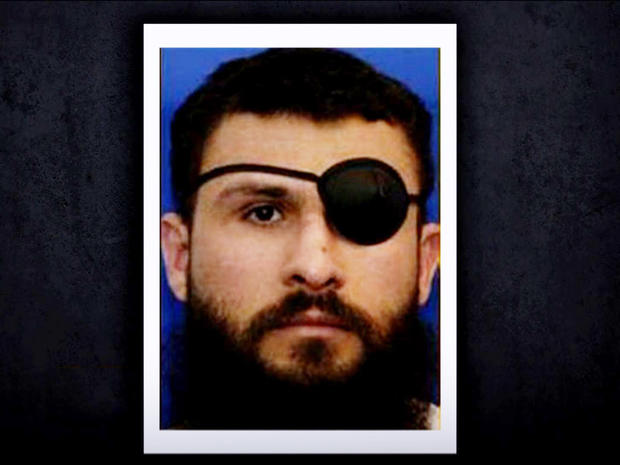Abu Zubaydah begs Guantanamo prosecutors to charge him
(CBS News) NEW YORK - The al Qaeda operative known as Abu Zubaydah, the longest-held "high value" detainee currently incarcerated at the U.S. military base in Guantanamo Bay, Cuba, is asking the government to please bring charges against him.
"It appears to us as though they have resolved in their mind the desirability of just leaving him there and forgetting about him," Joseph Marguiles, his defense attorney, told CBS NEWS in a telephone interview.
Seeking an end to Zubaydah's legal limbo, Margulies, a professor at Northwestern University School of Law, in Chicago, has written a letter to the convening authority for the military commissions at Guantanamo asking for proceedings to begin "at the earliest possible date."
"Come on let's go. Call you first witness," Margulies said in the interview. "He's just on anyone's radar anymore."
Khalid Sheikh Mohammed tries to "orchestrate drama" at Guantanamo trialInside the Guantanamo courtroom
Since even before his decade in captivity, Zubaydah, has been reputed to be an important al Qaeda figure, depicted as a one-time gatekeeper to terrorist training camps in Afghanistan, such as the Khalden camp attended by recruits including would-be LAX millennium bomber Ahmed Ressam and Kenya embassy bomber Mohamed al'Owhali.
Announcing Zubaydah's transfer in September 2006 from a secret CIA prison to Guantanamo, President George W. Bush described him as "a senior terrorist leader and a trusted associate of Osama bin Laden."
Margulies said there is a "yawning chasm" between who Zubaydah is renowned to be and who he really is.
Zubaydah, whose true name is Zayn al-Abdeen Mohammed Hussein, is 41, a Saudi of Palestinian descent, prisoner #10016 at Guantanamo.
"His detention is lawful," Marguiles said, as long as the war on terror lingers.
"He simply requests the opportunity to test the government's evidence and demonstrate in a legitimate setting...that he is innocent of any crimes," his letter stated.
Marguilies brought and won the first of a series of Supreme Court cases, Rasul vs. Bush, that challenged the conditions of confinement at Guantanamo. Rasul opened the door to detainees being able to legally challenge their imprisonment.
In May 2009, President Barack Obama outlined five categories for the fate of Guantanamo detainees, and Zubaydah fell into the one of those "who cannot be prosecuted yet who pose a clear danger to the American people."
"We're stuck," Margulies said. "They figure, 'We'll just hold him - we can and we will.'"
Zubaydah was shot and captured in March 2002 raid on a safe house in Faisalabad, Pakistan, and then transferred to a military base in Thailand, where he was first questioned by two FBI agents with vast experience handling al Qaeda suspects, Ali Soufan and Stephen Gaudin.
Subjected only to standard interrogation techniques, Zubaydah revealed to Soufan and Gaudin the crucial confirmation that the person then known to investigators only as "Mukhtar," the planner of the September 11th terrorists attacks, was Khalid Sheikh Mohammed.
Zubaydah also gave the agents a number of leads, such as that American Jose Padilla had undergone al Qaeda training and was tasked and financed by KSM to return to the U.S. in an effort to set off a radioactive "dirty bomb."
Later, CIA interrogators took control over Zubadyah and employed what the agency called "enhanced interrogation techniques" and critics call torture. Zubaydah was subjected to the simulated drowning called water-boarding on 83 occasions.
There has never been criminal charges or military charges brought against him. No Navy JAG lawyer has been assigned to him, a sign Margulies said, that his client is not in the legal pipeline. Marugulies, who last saw Zubaydah a month ago, said he worries about his mental health.
Explaining his letter to the convening authority in an Op-Ed in today's Los Angeles Times Margulies wrote: "Abu Zubaydah has been in custody for more than 10 years without being able to answer his accusers, or even know what he is accused of. We've come to the conclusion that a prosecution in a flawed system is better than nothing. At least in the commission system the government would have to put up or shut up. And it's about time that happened."
Besides the military commission for KSM and four other alleged 9/11 conspirators, a commission has begun at Guantanamo for one other detainee - Abd al-Rahim al-Nashiri - for overseeing the October 2000 suicide bombing on the USS Cole in Yemen which killed 17 US sailors.
Before the two commissions underway, only seven cases had been adjudicated at Guantanamo since the detention center began receiving prisoners in 2002. After peaking at 779 detainees, the prison has only 171 left.
